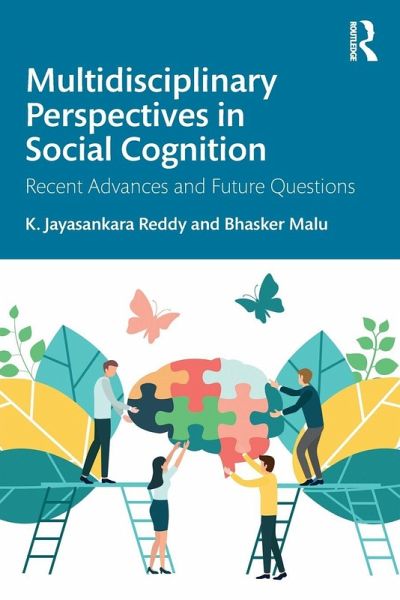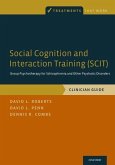Bhasker Malu, K. Jayasankara Reddy
Multidisciplinary Perspectives in Social Cognition
Recent Advances and Future Questions
Bhasker Malu, K. Jayasankara Reddy
Multidisciplinary Perspectives in Social Cognition
Recent Advances and Future Questions
- Broschiertes Buch
- Merkliste
- Auf die Merkliste
- Bewerten Bewerten
- Teilen
- Produkt teilen
- Produkterinnerung
- Produkterinnerung
This book introduces social cognition from multidisciplinary perspectives, exploring in detail how individuals perceive, interpret, and respond to social stimuli throughout different stages of life.
Andere Kunden interessierten sich auch für
![Social Psychological Perspectives on Stigma Social Psychological Perspectives on Stigma]() Social Psychological Perspectives on Stigma62,99 €
Social Psychological Perspectives on Stigma62,99 €![Social Cognition and Interaction Training (Scit) Social Cognition and Interaction Training (Scit)]() David L RobertsSocial Cognition and Interaction Training (Scit)102,99 €
David L RobertsSocial Cognition and Interaction Training (Scit)102,99 €![Applied Behavior Analysis of Language and Cognition Applied Behavior Analysis of Language and Cognition]() Applied Behavior Analysis of Language and Cognition57,99 €
Applied Behavior Analysis of Language and Cognition57,99 €![Mid-Life Psychological and Spiritual Perspectives Mid-Life Psychological and Spiritual Perspectives]() Janice BrewiMid-Life Psychological and Spiritual Perspectives17,99 €
Janice BrewiMid-Life Psychological and Spiritual Perspectives17,99 €![Psychological Perspectives on Deafness Psychological Perspectives on Deafness]() Psychological Perspectives on Deafness82,99 €
Psychological Perspectives on Deafness82,99 €![Public Health Perspectives on Depressive Disorders Public Health Perspectives on Depressive Disorders]() Public Health Perspectives on Depressive Disorders60,99 €
Public Health Perspectives on Depressive Disorders60,99 €![Contemporary Perspectives on Play in Early Childhood Education (PB) Contemporary Perspectives on Play in Early Childhood Education (PB)]() Contemporary Perspectives on Play in Early Childhood Education (PB)62,99 €
Contemporary Perspectives on Play in Early Childhood Education (PB)62,99 €-
-
-
This book introduces social cognition from multidisciplinary perspectives, exploring in detail how individuals perceive, interpret, and respond to social stimuli throughout different stages of life.
Hinweis: Dieser Artikel kann nur an eine deutsche Lieferadresse ausgeliefert werden.
Hinweis: Dieser Artikel kann nur an eine deutsche Lieferadresse ausgeliefert werden.
Produktdetails
- Produktdetails
- Verlag: Taylor & Francis Ltd
- Seitenzahl: 272
- Erscheinungstermin: 4. März 2025
- Englisch
- Abmessung: 234mm x 156mm
- ISBN-13: 9781032805870
- ISBN-10: 1032805870
- Artikelnr.: 71850811
- Herstellerkennzeichnung
- Produktsicherheitsverantwortliche/r
- Europaallee 1
- 36244 Bad Hersfeld
- gpsr@libri.de
- Verlag: Taylor & Francis Ltd
- Seitenzahl: 272
- Erscheinungstermin: 4. März 2025
- Englisch
- Abmessung: 234mm x 156mm
- ISBN-13: 9781032805870
- ISBN-10: 1032805870
- Artikelnr.: 71850811
- Herstellerkennzeichnung
- Produktsicherheitsverantwortliche/r
- Europaallee 1
- 36244 Bad Hersfeld
- gpsr@libri.de
K. Jayasankara Reddy is Professor of Neuropsychology and Cognitive Neuroscience and Dean of the School of Social Sciences at Christ University, Bangalore, India. Bhasker Malu is Associate Professor at the Jindal Institute of Behavioral Sciences (JIBS) at O.P. Jindal Global University, India
Part 1: What Is Social Cognition and How Is It Studied? 1. Social Cognition
and Its Emergence 2. Methods, Procedures, Latest Trends in Social Cognition
Research Part 1: Guided Questions and Answers Part 2: Cognitive
Perspective: How Cognition Processes Social Situations 3. Attention and
Perception in the Social Cognition 4. Affect Motivation and Behaviour 5.
Memory, Learning, and Language in the Social Cognition 6. Applied
Decision-Making 7. Information Processing and Social Media Part 2: Guided
Questions and Answers Part 3: Social Perspective: Cognition Underpinning
Social Behaviour 8. Social Cognition and Attitude, and Attribution 9.
Prejudice and Stereotype 10. Theory of Mind, Self and Others 11. Social
Perceptions and the Online World 12. Understanding Cross-Cultural
Perspective in Social Cognition Part 3: Guided Questions and Answers Part
4: Social Cognition Across the Lifespan and Clinical Presentation 13.
Social Cognition in Early Years - Infancy and Adolescence 14. Social
Cognition and Ageing 15. Impact of Technology on Lifespan Development 16.
Social Cognition in Clinical Disorders Part 4: Guided Questions and Answers
Part 5: Applications 17. Interventions using Social Cognition 18.
Application on the Social World - Design thinking, UX/UI research, Digital
Communication 19. Rehabilitation: Improving Social Cognitive Skills Part 5:
Guided Questions and Answers
and Its Emergence 2. Methods, Procedures, Latest Trends in Social Cognition
Research Part 1: Guided Questions and Answers Part 2: Cognitive
Perspective: How Cognition Processes Social Situations 3. Attention and
Perception in the Social Cognition 4. Affect Motivation and Behaviour 5.
Memory, Learning, and Language in the Social Cognition 6. Applied
Decision-Making 7. Information Processing and Social Media Part 2: Guided
Questions and Answers Part 3: Social Perspective: Cognition Underpinning
Social Behaviour 8. Social Cognition and Attitude, and Attribution 9.
Prejudice and Stereotype 10. Theory of Mind, Self and Others 11. Social
Perceptions and the Online World 12. Understanding Cross-Cultural
Perspective in Social Cognition Part 3: Guided Questions and Answers Part
4: Social Cognition Across the Lifespan and Clinical Presentation 13.
Social Cognition in Early Years - Infancy and Adolescence 14. Social
Cognition and Ageing 15. Impact of Technology on Lifespan Development 16.
Social Cognition in Clinical Disorders Part 4: Guided Questions and Answers
Part 5: Applications 17. Interventions using Social Cognition 18.
Application on the Social World - Design thinking, UX/UI research, Digital
Communication 19. Rehabilitation: Improving Social Cognitive Skills Part 5:
Guided Questions and Answers
Part 1: What Is Social Cognition and How Is It Studied? 1. Social Cognition
and Its Emergence 2. Methods, Procedures, Latest Trends in Social Cognition
Research Part 1: Guided Questions and Answers Part 2: Cognitive
Perspective: How Cognition Processes Social Situations 3. Attention and
Perception in the Social Cognition 4. Affect Motivation and Behaviour 5.
Memory, Learning, and Language in the Social Cognition 6. Applied
Decision-Making 7. Information Processing and Social Media Part 2: Guided
Questions and Answers Part 3: Social Perspective: Cognition Underpinning
Social Behaviour 8. Social Cognition and Attitude, and Attribution 9.
Prejudice and Stereotype 10. Theory of Mind, Self and Others 11. Social
Perceptions and the Online World 12. Understanding Cross-Cultural
Perspective in Social Cognition Part 3: Guided Questions and Answers Part
4: Social Cognition Across the Lifespan and Clinical Presentation 13.
Social Cognition in Early Years - Infancy and Adolescence 14. Social
Cognition and Ageing 15. Impact of Technology on Lifespan Development 16.
Social Cognition in Clinical Disorders Part 4: Guided Questions and Answers
Part 5: Applications 17. Interventions using Social Cognition 18.
Application on the Social World - Design thinking, UX/UI research, Digital
Communication 19. Rehabilitation: Improving Social Cognitive Skills Part 5:
Guided Questions and Answers
and Its Emergence 2. Methods, Procedures, Latest Trends in Social Cognition
Research Part 1: Guided Questions and Answers Part 2: Cognitive
Perspective: How Cognition Processes Social Situations 3. Attention and
Perception in the Social Cognition 4. Affect Motivation and Behaviour 5.
Memory, Learning, and Language in the Social Cognition 6. Applied
Decision-Making 7. Information Processing and Social Media Part 2: Guided
Questions and Answers Part 3: Social Perspective: Cognition Underpinning
Social Behaviour 8. Social Cognition and Attitude, and Attribution 9.
Prejudice and Stereotype 10. Theory of Mind, Self and Others 11. Social
Perceptions and the Online World 12. Understanding Cross-Cultural
Perspective in Social Cognition Part 3: Guided Questions and Answers Part
4: Social Cognition Across the Lifespan and Clinical Presentation 13.
Social Cognition in Early Years - Infancy and Adolescence 14. Social
Cognition and Ageing 15. Impact of Technology on Lifespan Development 16.
Social Cognition in Clinical Disorders Part 4: Guided Questions and Answers
Part 5: Applications 17. Interventions using Social Cognition 18.
Application on the Social World - Design thinking, UX/UI research, Digital
Communication 19. Rehabilitation: Improving Social Cognitive Skills Part 5:
Guided Questions and Answers








